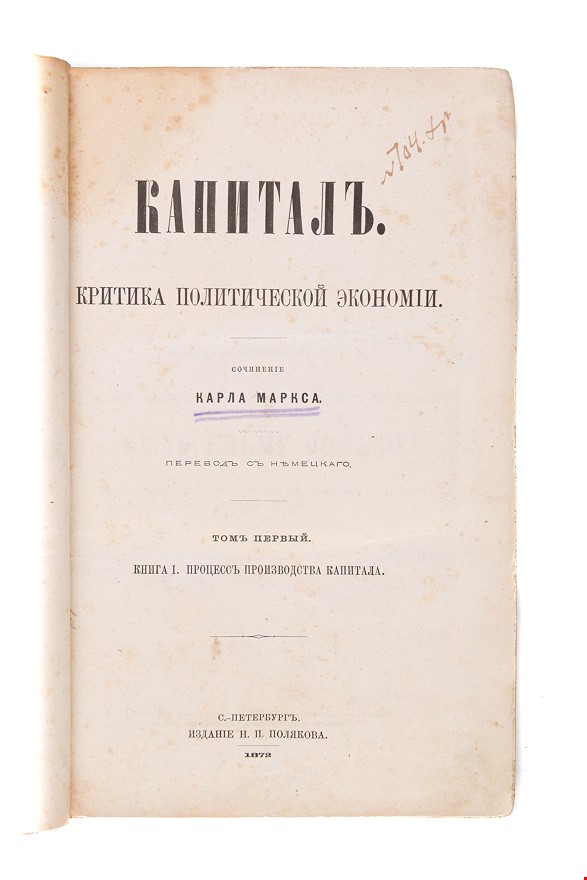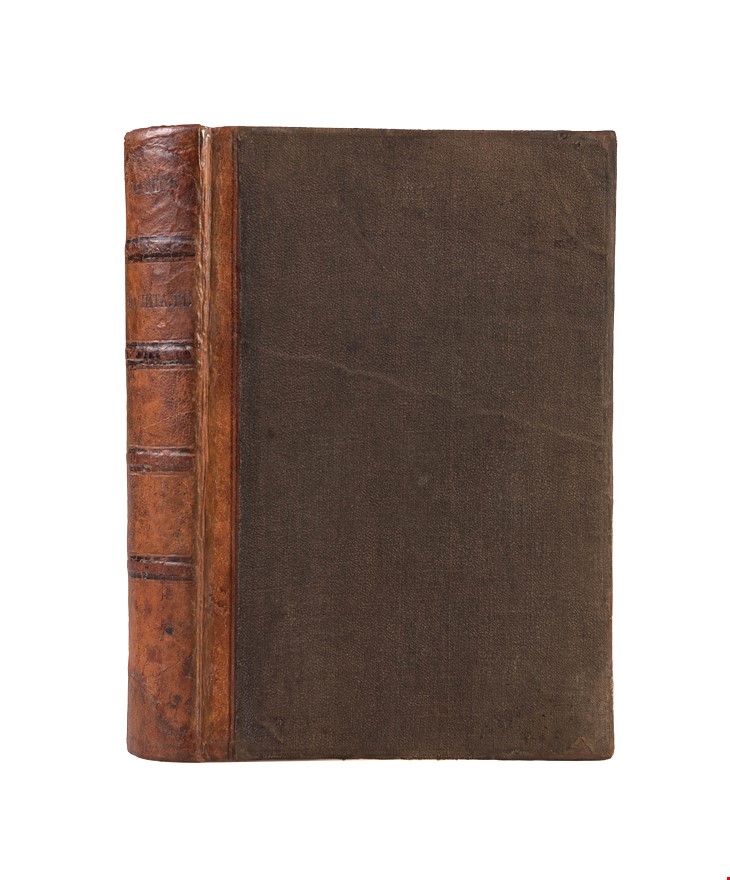Kapital. Kritika politicheskoi ekonomii.
MARX Karl (1872.)
£15000.00 [First Edition]
Please contact us in advance if you would like to view this book at our Curzon Street shop.
THE FIRST TRANSLATION OF DAS KAPITAL TO APPEAR IN ANY LANGUAGE
First edition in Russian. 8vo. [2], xiii, [3], 678 pp. With the half title. Contemporary quarter roan with brown cloth covered boards, spine with four single raised bands outlined in black, first and second panels lettered in blind (neat ink inventory number and Marx's name underlined in pencil to title, a few occasional pencilled underlings and marginal highlights, neat pencilled annotation to head of p. 7, some minor spotting, notwithstanding a nice example, internally cleaner than usually encountered; spine skilfully restored, a very good copy indeed). St. Petersburg, N. P. Poliakov.
The first translation of Das Kapital to appear in any language, and arguably the most important.
In one of the great ironies of modern printing history, the censors permitted the publication of Das Kapital in Imperial Russia, dismissing the book as a "colossal mass of abstruse, somewhat obscure politico-economic argumentation", and concluding confidently "that in Russia few will read it and even fewer will understand it" (quoted in Resis, p. 221).
The Russian translation was the initiative of the Russian socialist economist Nikolai Danielson (1844-1918). Danielson had read Das Kapital in the original German shortly after its publication, "and the work made so strong an impression on him that he immediately undertook to bring the book to the Russian reading public" (Resis, p. 223). The project would initiate a life-long correspondence between Danielson and Marx, with Danielson helping Marx source essential Russian material to aid Marx’s research, and Danielson would also later produce Russian translations of the posthumously published second and third volumes of Das Kapital.
The first task was to find a willing publisher in Russia and Danielson eventually settled on the radical publisher Nikolai Petrovich Poliakov (1843-1905), who agreed to back the project on the condition that Danielson find an able translator. Ironically, it was not Marx's Das Kapital that would bring Poliakov's publishing career to an end, but rather a collection of Denis Diderot’s novels and short stories published ten months later that was banned by the censors who also liquidated his publishing house.
Danielson wrote to Marx in September 1868, who replied immediately with his consent to undertake the project. However, nearly four years would pass until the translation was finally published, "and four translators tried their hand at it before Danielson was able to send the manuscript to the printers in late December 1871" (Resis, p. 220).
The first translator commissioned to undertake the mammoth task was none other than Marx's great adversary the Russian revolutionary anarchist Mikhail Bakunin (1814-1876), who accepted the work due to his desperate financial situation. Despite taking an advanced payment from the publisher, Bakunin found the work tedious and would abandon the project after completing only part of the first chapter (White, p. 13). Bakunin’s brief involvement in the project was followed shortly after by his famous split with Marx at the International Workingmen's Association (First International).
The task next fell to German Lopatin (1845-1918), a close associate of Danielson's, who translated about a third of the volume. However, Lopatin's work on the translation ended abruptly in November 1870 when he was imprisoned in Russia for attempting to free the great Russian socialist writer Nikolay Chernyshevsky from prison. The remaining chapters were translated by Danielson himself with the assistance of Nikolai Liubavin (1845-1918).
Marx's active involvement in the project is of particular note and played its own role in the protracted nature of the translation. Marx was simultaneously working on both the second German edition and first French translation of Kapital and had intended on supplying Danielson with copies of each in order to incorporate the new revisions to the text. However, both of these projects would also be delayed, and Danielson would have to make do with a letter from Marx outlining some of the key changes.
The manuscript was finally sent to the printers in late December 1871 and the last remaining hurdle was the Russian censors. Interestingly, the original German edition of Kapital had not been banned by Central Committee of Censors of Foreign Publications and this leniency no doubt provided encouragement for Danielson and the publisher Poliakov (Resis, p. 221).
The office of Censors of Domestic Publications assigned two readers to the task of scrutinizing the text; D. Skuratov, who was tasked with the first half of the book, and A. De-Roberti, who read the second. Although both censors were able to identify numerous objectionable socialist and antireligious passages, Skuratov dismissed these offending sections in his final report as harmless, since they were imbedded in a "colossal mass of abstruse, somewhat obscure politico-economic argumentation", concluding that "it can be confidently that in Russia few will read it and even fewer will understand it" (quoted in Resis, p. 221).
The Russian translation of Das Kapital was finally published on the 27th of March 1872 in an edition of 3,000 copies. Amusingly, the only part of the book forbidden by the censor was the inclusion of a portrait of Marx. By the standards of 700-page economic treatises, the publication was a great success and the edition rapidly sold out, with 1,000 copies already sold by the 15th of May. Marx was delighted and praised the translation as "masterly" in a letter to Danielson dated 28 May 1872 (MECW, Vol. 44, p. 385).
Despite the commercial success of the translation, the early response to Das Kapital in Russia was varied and did not necessarily mark the advent of Russian Marxism as such. Das Kapital appeared in Russia when aspects of modern industrialisation were starting to take form in the Russian economy following the vast changes brought about by the Emancipation of the Serfs in 1861. The vices and virtues of industrialisation dominated popular Russian discourse and it was precisely Marx's brilliant description of the modern industrial system that drew many to Das Kapital (Resis, p. 224).
For diverse parties from across the political spectrum, Das Kapital represented a stark warning of what was in store if Russia followed the trajectory of Western industrial development. Its publication did not necessarily denote an immediate shift towards socialism in Russia, but rather fed into pre-existing concerns about Russia's economic destiny and its future relations with Europe.
Marxism was only one of many 'socialisms' that competed for adherence in Russia in the years following the publication of Das Kapital, and the Russian political landscape would be dominated by agrarian socialism of the narodniki or 'Populists'. "Indeed, none of the young men associated with the appearance of this Russian edition of Das Kapital ever became a revolutionary Marxist, even though Lopatin, Danielson, and Liubavin lived to see the Bolshevik Revolution" (Resis, p. 224).
It would not be until the emergence of Georgi Plekhanov's Emancipation of Labour group in Geneva during the early 1880s that Marxism and Das Kapital would come to the fore amongst the disparate Russian socialist movement.
The printing of a second edition of Das Kapital was eventually forbidden in Russia and so in 1890 a New York publisher brought out an nearly identical reprint of the first edition: that second edition is distinguished from the first in that the misplaced comma opposite "p. 73" in the table of contents is replaced by a full stop; and the "e" at the end of l. 40, p. 65, is replaced by a "c".
See: Albert Resis, 'Das Kapital Comes to Russia'; James D. White, Marx and Russia: The Fate of a Doctrine.
Rubel, 633n.
Stock Code: 243124





